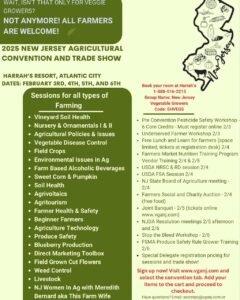 A Stop the Bleed® training will take place at the NJ Agricultural Convention and Trade Show on Thursday, February 6, 2025 from 10 AM to 12 PM. Don’t miss this opportunity to learn the life-saving skills of pressure application, wound packing, and use of tourniquets. Registrants for this free training will also receive a complementary bleeding control kit.
A Stop the Bleed® training will take place at the NJ Agricultural Convention and Trade Show on Thursday, February 6, 2025 from 10 AM to 12 PM. Don’t miss this opportunity to learn the life-saving skills of pressure application, wound packing, and use of tourniquets. Registrants for this free training will also receive a complementary bleeding control kit.
Space is limited, secure your spot today!
To attend, you must first register for the NJ Agricultural Convention and Trade Show. Single and multi-day passes are available on the VGANJ website.
Then, email Kate Brown (Ag Agent, RCE-Somerset County) at kbrown@njaes.rutgers.edu to reserve your spot for the training. Please include participant’s name and a contact phone number.
Questions? Email kbrown@njaes.rutgers.edu.



 Uncontrolled bleeding after injury is a primary
Uncontrolled bleeding after injury is a primary 
